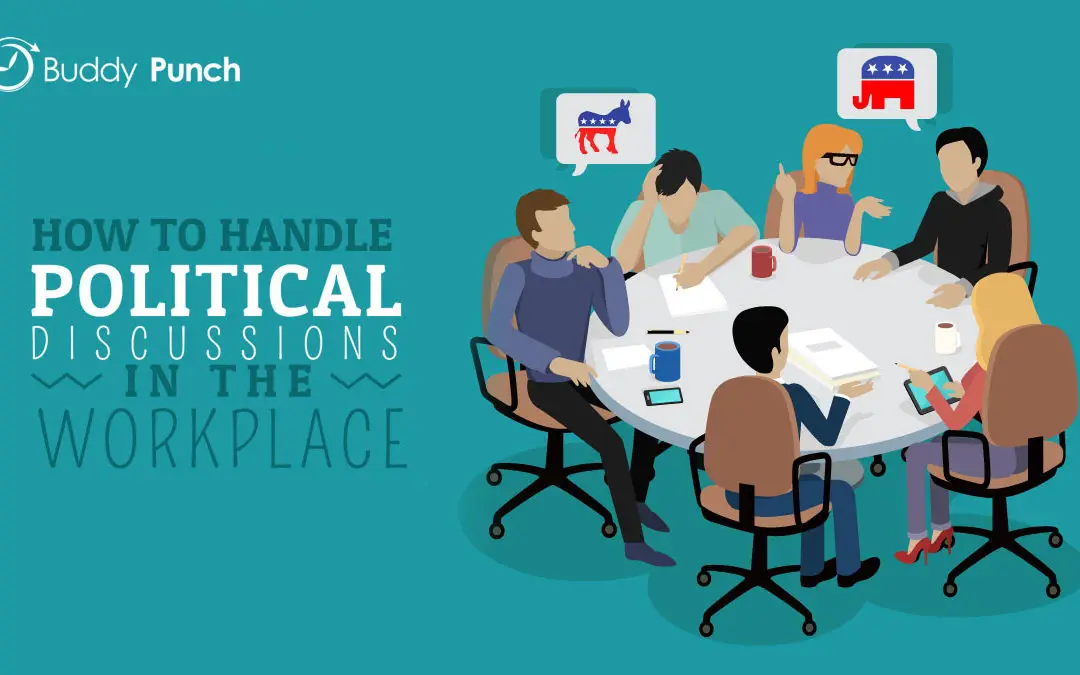How to Handle Political Discussions in the Workplace

It has long been said that two things should not be discussed in the workplace or at the dinner table: politics and religion. Nothing can agitate or work someone up more quickly than a disagreement about politics or religion.
According to a recent study, 54% of employees have discussed politics at work. Of those employees, 40% reported that discussing political views led them to feel negative about a coworker or boss.
Nearly a quarter (24%) of companies have a formal, written policy regarding political activities and conversations in the workplace; 8% report having an informal, unwritten policy. However, the remainder of organizations surveyed (over 60%) does not have any kind of policy or guidelines set about this topic. Does that mean politics should be completely barred from the workplace? How should you handle this? It can often be difficult to know when a conversation has turned from casual to a confrontation. Here a few guidelines for you:
Find an area of agreement
A good tip to keeping a political conversation peaceful is to get the other person to agree to something or you with them, no matter how insignificant. People are usually more willing to talk and listen to someone that they feel they have something in common with on some level.
This does not mean that you must agree with the other person’s viewpoint. It is just finding neutral, common ground. This helps eliminate negative feelings surrounding the conversation or topic. If you both agree with a specific outcome, discussing the pros and cons of different alternatives should be able to be done relatively peacefully.
Most importantly, remember not to take it personally. Politics can cause conflict in the workplace like nothing else, because in this instance the conversation is about philosophies, not necessarily something the other person has done on the job. It is very important to find common ground and concentrate on that aspect instead.
You attract more with honey
The saying really is true: “You attract more flies with honey than with vinegar.” This also applies to political topics. Of course, everyone wants to “convert” members of the opposing political party and bring them around to your view. However, posting contentious messages, angry comments, or wearing political paraphernalia will only push people away from your viewpoint. Anger, belittlement, and sarcasm may seem useful short-term impact, but they ultimately make the other person very defensive and even more determined not to change in their position.
Fight outside the workplace
Quite a few of the topics that are “hot button topics” are already written into law (i.e., same-sex marriage, healthcare coverage, economics). Disagreeing with these laws and debating the validity in the workplace will change nothing. Take your disapproval to the proper channels – the local, state, or federal government.
You are, of course, allowed your opinion on specific established laws, you can get yourself into trouble discussing protected classes or groups. You would be labeled as “discriminatory” or worse. It is best to keep these topics out of the workplace.
Try to be non-partisan
Even though it can be extremely difficult at times, sometimes it is best to take a non-partisan stand on certain topics. Try to focus on a common goal, not a dividing topic. This is not necessarily condoning someone else’s opposite viewpoint, but it helps diffuse rising tensions.
Change the topic
If all else fails, try to change to topic. Sometimes a political conversation has gone too far, or you may merely not want to talk about it. Try to re-focus the conversation on a work task at hand or ask the other person a question about a different topic. Keep the conversation work-related.
Politely refuse to participate
If you are trying to avoid political discussions, kindly tell your boss or co-worker that you prefer to avoid political conversations at work and want to keep your opinion to yourself. As long as this is done in a professional manner, most people do not have a problem with this response.
Remember that political figures do not last forever
Do not let your strong feelings about a political topic or candidate ruin your relationship with a co-worker or boss. You will have to rely on them and work with them, many times for years to come. Feelings come and go, but employment and business contacts take a much longer time to build and maintain.
